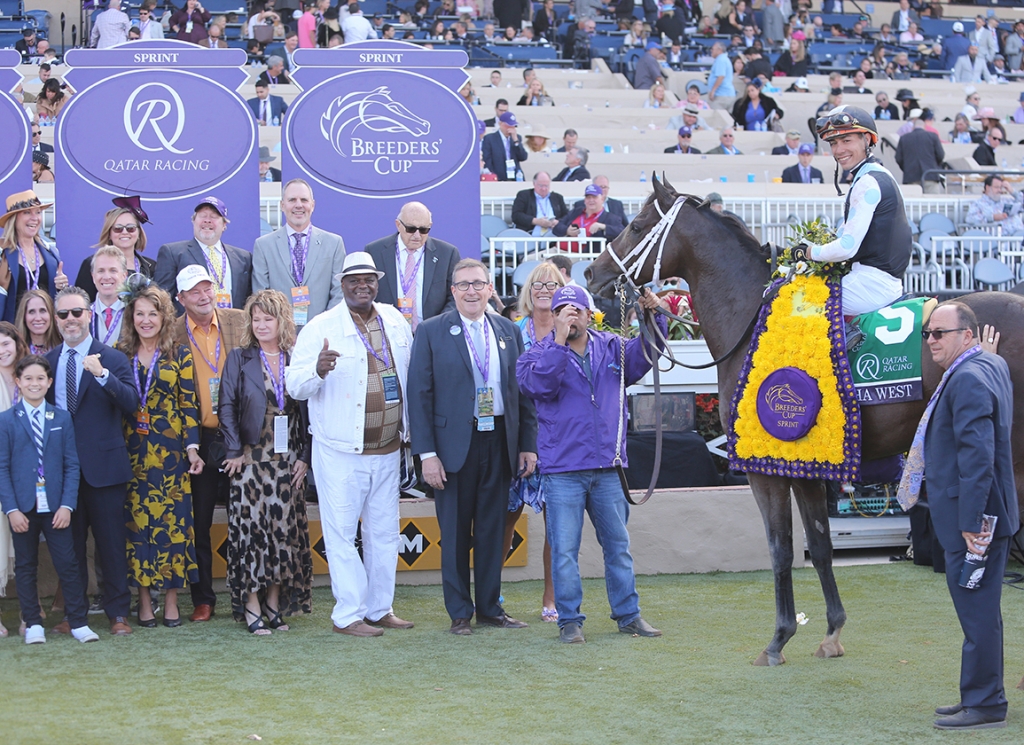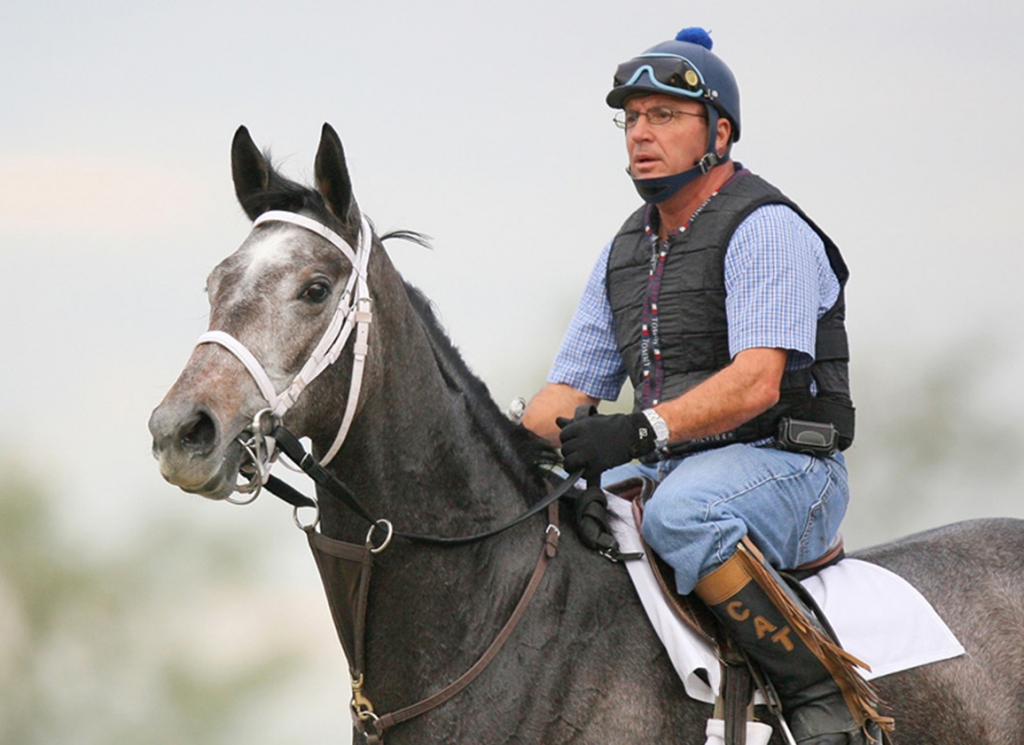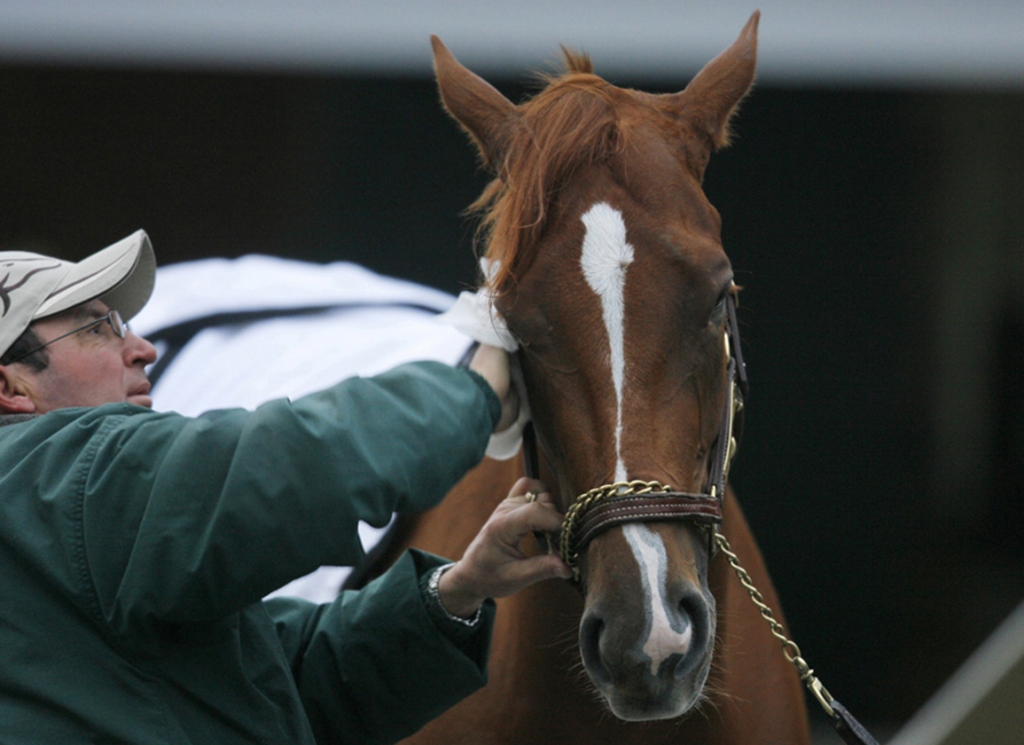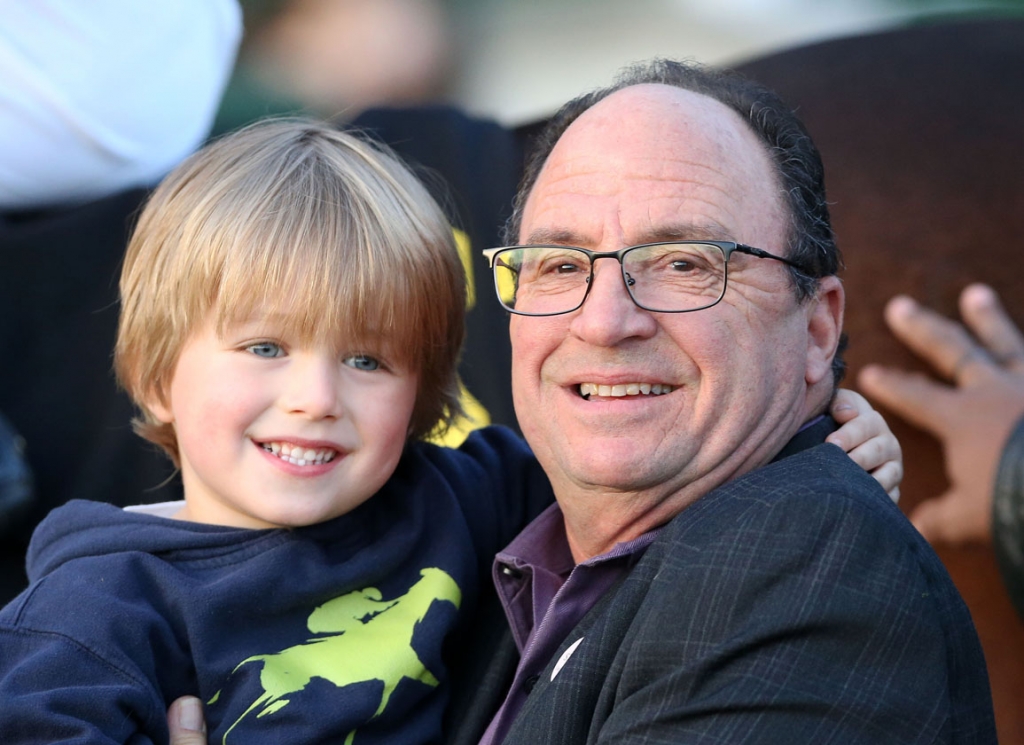During the best of times, racing can be a rollercoaster. And for Wayne Catalano, like most other horsemen and women in the sport, that tumultuous lifestyle quickly becomes a way of life. However, despite facing several challenges–both professionally and personally–over the past decade, including a showdown with his own mortality after teetering scarily close to the edge of the eternal precipice, the 'Catman' lived up to his nickname at this year's Breeders' Cup by righting himself midair and landing squarely on his feet in the winner's circle following Aloha West (Hard Spun)'s GI TVG.com Breeders' Cup Sprint victory at Del Mar.
“After 50 years of doing this, we're a bit light on horses and we don't see as much action as we used to, so to win a race like this, it's the pinnacle of my career,” said the 65-year-old, who appeared visibly moved during the post-race interview. “Given the limited opportunities that we have right now, this ranks as one of the best.”
Following Aloha West's thrilling Sprint victory, the press was quick to point out that the New Orleans native, already a three-time Breeders' Cup-winning trainer, was collecting his fourth title at the Championships. Trumpeting his prior wins with 2006 and 2009 GI Juvenile Fillies scorers Dreaming of Anna (Rahy) and She Be Wild (Offlee Wild)–both subsequent Eclipse Award champions–in addition to 2011 GII Breeders' Cup Juvenile Fillies Turf heroine Stephanie's Kitten (Kitten's Joy), it was as if the years since had passed unmolested. But in fact, they hadn't.
Catalano enjoyed banner seasons in 2013 and 2014, highlighted by Grade I winners Stephanie's Kitten and Room Service (More Than Ready), in addition to GSWs Imposing Grace (Empire Maker), Title Contender (Pulpit), Solitary Ranger (U S Ranger), I'm Already Sexy (Ready's Image), Poker Player (Harlan's Holiday), Aurelia's Belle (Lemon Drop Kid) and West Coast Belle (Tapit). The business continued to hum along into the summer of 2014, but with just days to go to his 58th birthday, the horseman came down with acute respiratory distress syndrome after contracting Asian Avian Influenza A, which precipitated an epic battle with pneumonia. After spending 22 days in Saint Alexius Medical Center's intensive care, of which nine days were spent under an induced coma, he was finally released to go home.
“Fortunately, I had really great help at that time,” he recalled. “And the horses were really running well. During that time, I won my 1000th race at Arlington and the 2,500th race in my career. The barn was just rolling.”
According to Catalano, during his stint in the hospital, a friend and fellow horseman took to saying, “'Look this guy is in a coma and he's still kicking our ass!'”
For many, the frightening episode might have proven life-altering, however, Catalano admits that his 'coming to Jesus' moment never really materialized.
“It didn't affect the size of my operation, but you know, it should have,” he said. “Because I really thought I was going to cut down after that.”
He added with a laugh, “Any thoughts about cutting back to one division went away in about one week. I went back to the same thing. It didn't stop me. I just kept going.”

Winning connections after Aloha West's Sprint win | Horsephotos
Building on Bedrock
Catalano received his earliest racetrack education under the guidance of legendary horseman and Hall of Fame trainer Jack Van Berg. He had spent much of his youth around horses, thanks to the influence of his 2 1/2-year older brother, Joe, who would go on to become a jockey. Working as a groom and walking hots for Van Berg, he subsequently got his start as a jockey as soon as he turned 16 in 1974. And Catalano quickly rose through the ranks while riding first call for the Hall of Famer and later for Frank Kirby at Hawthorne Race Course. As a rider, Catalano won 1,792 races throughout his career, highlighted by the 1977 season when he won 349 races, second only behind Steve Cauthen while finishing ahead of a slew of future Hall of Famers, including Chris McCarron, Laffit Pincay, Jr., Angel Cordero, Jr. and Eddie Delahoussaye. He hung up his silks in 1983.
“My knee started to aggravate me a little bit near the end and the [quality] of my mounts fell off a bit too,” he said, explaining the decision to stop riding. “I won a lot of races, titles and did really well, but I didn't have as many stakes horses as I would have liked. I was also getting a little older and I wasn't comfortable anymore.
“My knee was bugging me, but more importantly, my heart got weaker,” he said with a chuckle. “If your heart's not in it, you just got to quit.”
Whether by design or scripted by fate, Catalano had already given himself a solid foothold into the next chapter of his career as a trainer. During his tenure with Van Berg, Catalano spent much of his time learning the basics of horsemanship, even during his days as a jockey.
“It didn't matter what you were there for, Jack would teach you horsemanship,” he explained. “So, I learned how to be a horseman first. Being a jockey came afterward. Nearing the end of my riding career, I wanted to be a trainer so I started hanging around the barn, coming back after my rides and learning the ropes. I didn't just ride horses and go home, like most jockeys do.”
Underscoring the importance of learning the tools of the trade from such an iconic horseman, Catalano explained, “Jack taught me hard work and horsemanship. They are the main ingredients that I picked up from him. You have to know how to take care of a horse, first and foremost. And I had the opportunity to learn from one of the greatest trainers of all time.”

Wayne Catalano & GSW Dreaming of Liz | Horsephotos
Ebb and Flow
A considerable amount of Catalano's early success can be pinpointed through his association with oil magnate John Franks, a five-time Eclipse Award winning owner. Armed with a battalion of horses up until his death in 2004, the Louisiana mogul proved to be a valuable source of horse-power for several trainers around the country, including Catalano.
“When I went out on my own, Jack gave me a few horses and then I was introduced to John Franks. I won my first stakes race with him with Croupier Lady. We had tremendous success together,” he said.
Another owner that helped expand Catalano's operation was Chicago businessman Frank Calabrese. The often tempestuous partnership–which was highlighted by a slew of stakes winners, including champion juvenile filly Dreaming of Anna and MGSW Lewis Michael (Rahy)–ended in 2009.
“A big reason I was in Chicago so long was because of [leading Arlington owner] Frank [Calabrese],” said Catalano. “So, when we parted company, my situation in Illinois wasn't really beneficial anymore.
“I had some of my clients who didn't want to race up there. It soon became obvious it just wasn't where I needed to be at that point in time, so we moved our base of operations to Kentucky. And we've been here every year since.”
Having enjoyed a blistering record in Illinois, which included 11 training titles at the recently shuttered Arlington Park, a trio at Hawthorne Race Course and two at Sportsman's Park, Catalano finally found the rocks when transitioning his fleet to Kentucky.
“Leaving my home base of Chicago and moving to Kentucky, we did well but things got a little bit lighter,” he admitted. “We maintained a smaller group and did well, winning races at Keeneland, Churchill Downs and Kentucky Downs. But it just started to get a little bit lighter.
“At one point, when I had horses for Frank, I had about 50 horses just for him. That made a big difference. On the flipside, I once went from 50 horses in my barn to only a pony. There was another time when I had no horses. So, I've reinvented myself a few times.”
Granted the opportunity to usher a slew of top-caliber competitors to the zenith of their careers, Catalano also experienced the shaded underbelly of the game, having lost rising stars to the other trainers. Chief among them are the aforementioned Stephanie's Kitten, who went on to be a Grade I winner for Eclipse Award-winning trainer Chad Brown and Animal Kingdom (Leroidesanimaux {Brz}), who would go on to win the 2011 GI Kentucky Derby and 2013 G1 Dubai World Cup for trainer Graham Motion.

Wayne Catalano & Dreaming of Anna | Horsephotos
Asked if those experiences had left a bitter taste in his mouth, Catalano's reply was almost unexpected.
“Honestly, I was sitting watching the Derby with my wife, Animal Kingdom wins and I felt great. I felt really good about it,” he said. “Why? Because I know, I had a hand in helping develop the horse and I got him to where he needed to be before Graham Motion took over. And he did a great job with the horse. It's like passing the 'Refridgerator' the ball to win the Super Bowl… Just don't drop the ball.”
He continued, “To have a good horse, to develop him and put him in that situation for him to win the Derby, that's what I do. To put in that early ground work and to see it come through, that's very rewarding. No, I didn't get the win for myself in the end, but I knew what it took to get there. It wasn't the easiest thing, but I got the satisfaction in knowing that I played a big part in that.”
Under the guidance of Catalano, Ken and Sarah Ramsey's Stephanie's Kitten won six stakes, including a pair at the Grade I level–the Alcibiades S. and Longines Just a Game S. In 2014, Brown took over training duties from Catalano and the homebred won an additional four stakes, including the 2015 GI Flower Bowl S. and GI Breeders' Cup Filly and Mare Turf.
Catalano is quick to acknowledge that much of his success was built on horses with humble credentials rather than high-voltage pedigrees and physicals that often go to many of the bigger barns.
“To take a horse like Stephanie's Kitten, a homebred that couldn't sell for $17,000 and to win the Breeders' Cup, that's something to be proud of,” he said. “Also, She Be Wild was a $19,000 buyback at the sale and also went on to win a Breeders' Cup race. Room Service and Dreaming of Anna are also homebreds that won Grade Is. These are the horses I did it with. And not with million-dollar animals. I'm very proud of that.”
Despite facing a tighter ship of approximately 20-25 horses and a more streamlined roster of owners, Catalano has seen his share of success in recent years. Among the most notable are Coffee Pot Stables' Farrell (Malibu Moon), a seven-time stakes winner and earner of over $1 million. Her most notable wins were registered in the GII Fair Grounds Oaks, GII Rachel Alexandra S. and GII Golden Rod S. The homebred also finished runner-up in the GI La Troienne S. Making it a family affair, the filly was ridden throughout her career by Channing Hill, married to his and his wife Renee's daughter Shelbi. And Catalano admits that the importance of family, which includes three grandsons and a granddaughter on the way, is what propels him so much more these days.
“God knows what he is doing,” he asserted. “You have kids, a career and then you have your own grandchildren and you get to do it all over again, but you get to enjoy it a lot better. That's what I look forward to these days.”

Wayne Catalano & grandson Wayllen | Coady
On the Catwalk
Looking ahead to a 2022 campaign, the fun seems likely to continue for Catalano and Eclipse Thoroughbreds via Aloha West. According to the horseman, among options considered for the Maryland-bred is the $1.5-million Saudi Arabian Airlines Riyadh Dirt Sprint at King Abdulaziz Racecourse Feb. 26.
“I'm going to let the horse talk to me,” he said. “If he tells me he is ready to do something, then we'll make a plan as to what we want to do. It was a long trip [from Kentucky to California] and he came back good. We'll gather back up and go from there.”
With his Sprint champion safely back at the horseman's Lexington base on Rice Road, Catalano finally found a moment to reflect on his latest Breeders' Cup experience.
“When I was sitting up in the breakfast tent at the Breeders' Cup, watching the horses train I thought to myself, 'This is what it's all about, this is how every place should be,'” he said. “You get up seven days a week, three o'clock in the morning no matter if it's Christmas, Thanksgiving or New Year's and you put your whole life into this thing. You should have some fun. If you go to work every day and you enjoy it, then it isn't like work, right? Isn't that what they say?”
He continued, “The people around you also make a difference. Ones who can show their appreciation for the job that you did. Let's enjoy it. Everybody wants to win. To get there and have these moments, that's what's important. In these big races, we know only one horse is going to win. So just enjoy it win, lose or draw. [Eclipse Thoroughbreds'] Aron Wellman said to me before the [Sprint], 'No matter what the horse does, let's just have fun.' And that's what we did. That's what it's all about.”
And in the waning hours of Nov. 6, it seemed like things had come full circle for Catalano. Following a lifetime in service to the track and its inhabitants, all Catalano's hard work and struggles appeared to have converged into a single moment with a 4-year-old Maryland-bred getting his nose down first at the wire.
“I've been there a long time,” he said. “I started out many years ago–I was 15 years old when I started and I'm now 65. I've done it all, I've seen it all. Between the jockeys, agents, trainers and horses, you can name it and I can guide somebody through just about anything. After everything that I've accomplished, all the highs and lows, and to come back at this point with much less in the barn, and to win a race like that, we've done it. I feel good about it. I'm happy. All I want to do is make a good living, be close to my grandchildren and stay in the business…and to have fun.”

The post Catman’s Nine Lives…and Counting appeared first on TDN | Thoroughbred Daily News | Horse Racing News, Results and Video | Thoroughbred Breeding and Auctions.
Source of original post





